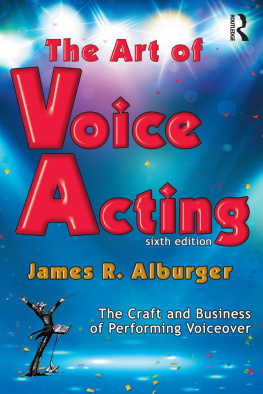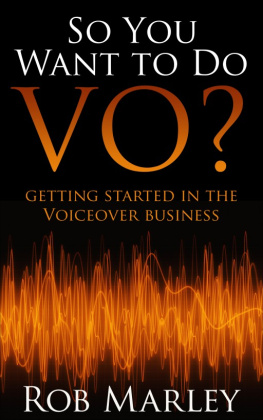How to Break intoVoiceover Avoid Common Pitfalls andLearn Step-by-Step How to Succeed in Voiceover By Christopher Prince Published by Christopher Prince atSmashwords Copyright 2011 by Christopher Prince Smashwords Edition, License Notes: This ebook is licensed for your personalenjoyment only. This ebook may not be re-sold or given away toother people. If you would like to share this book with anotherperson, please purchase an additional copy for each person youshare it with. If youre reading this book and did not purchase it,or it was not purchased for your use only, then you should returnto Smashwords.com and purchase your own copy. Thank you forrespecting the hard work of this author. What You Will Gain from This Book * Save significant time and money * Earn a living as a voiceover artist * Avoid the voiceover industry pitfalls * Contact hundreds of casting directors,agents, trainers, & demo producers * Make the right career choices What You Will Learn from This Book * Learn the critical steps of breaking intothe voiceover business * Learn the many career paths you can pursuein voiceover * Learn the pros and cons of agents andunions * Learn how to set up an inexpensive homestudio to audition from home * Learn how to market yourself for greatestsuccess Who Else Will Benefit the Most from ThisBook * New talent aspiring to break intovoiceover * On-camera actors seeking to expand intovoiceover * Veteran voiceover talent searching forbetter ways to market themselves TABLE OF CONTENTS You have agreat speaking voice and youve always been told you should becomea voiceover artist.
So now youre getting serious about starting avoiceover career. The trouble is, you don't know a whole lot aboutwhat it takes to become a successful voice actor. Well, the goodnews is, voice acting is a big business and is only getting bigger.The bad news is, voiceover is a highly competitive industry andvoice acting jobs are hard to come by. So you need to be armed withreliable information to have your best chance at succeeding invoiceover. Gone arethe days when voiceover was dominated by a handful of the topnarrators in Los Angeles and New York performing in radio andtelevision commercials. Today, voiceover artists live all aroundthe world and often record from home studios.
They perform ineverything from commercials, to corporate training videos, tocompany phone greetings and transmit their completed work via theinternet. With the proliferation of the internet andcommunication technologies, voiceover jobs are often crowdsourced,meaning they are offered at an open call to hundreds or thousandsof voiceover artists, often on casting websites sites that matchvoiceover artists with voiceover jobs. Plus, with the advancement in audio andvideo on the web, an ever-increasing demand for quality narrationawaits the next generation of voiceover talent. Unfortunately,the path to a successful voiceover career is not paved in gold. Somany aspiring voiceover artists go headlong into the businesswithout knowing the ropes and end up wasting a lot of time andmoney. Here are some of the common pitfalls that trap new voiceoverartists: Not getting proper training Without professional voiceover training, youare likely to waste money producing a poor demo reel and promotingyourself with no success.
Not getting proper feedback A lack of feedback about your voiceoverskills from qualified and experienced voiceover professionals canleave you deluded about your prospects for voiceover work. Producing a bad demo reel A bad voiceover demo reel -- usually theresult of insufficient training -- dooms your chances at getting anagent or getting work. Sending your reel to the wrong people Blindly sending your demo reel to anyone andeveryone related to the voiceover industry wastes a great deal oftime and money. Prematurely joining a union Joining the two voiceover unions before youeven know if you have a viable chance of getting regular work costsyou thousands of dollars that you may never recoup. Signing with an disreputable agent Agreeing to representation by a disreputableagent can put you in a bad position contractually and even harmyour reputation throughout the voiceover industry. Having unrealistic expectations Quitting your day job to pursue a voiceovercareer without all the facts will likely lead to financialdisaster.
To avoidthe many pitfalls of the voiceover industry, you should follow thisblueprint to successfully launch your voiceover career. Asuccessful voiceover career starts with following these fundamentalsteps: * Choose the right voiceover category foryou * Get professional voiceover training * Get honest professional feedback * Produce a solid demo reel * Land a reputable agent * Market yourself wisely * Join a union at the right time * Set achievable goals There are numerous categories within the field of voiceover.Which category you choose to pursue depends on your vocal qualitiesand performance ability. The most common voiceover categoriesinclude: * Commercial voiceover * Promo voiceover * Movie trailer voiceover * Animation voiceover * Audiobook voiceover * Industrial voiceover * Phone-on-hold voiceover Commercial voiceover Commercial voiceover is narration for radio,TV and internet commercials. Voice and performance types run thegamut in commercial voiceover, yet an increasing percentage ofcommercial voiceover projects require a "non-announcer" or "regularguy-gal" performance. Commercial voiceover commonly portrays a verynatural, real-world character and style. Promo voiceover Promo voiceover is narration for televisionshows and some other forms of promotional media.
The promo style ofnarration depends on the tone of the content -- comedic, dramatic,etc. -- yet typical performances vary from deep and resonant toanimated and projected. Highly distinct and unique voices aresought for promo work. Movie trailer voiceover Movie trailer voiceover is narration forTV/theater movie trailers. Subject to a great many parodies, movietrailer voiceover is almost always deep, resonant and highlydramatic. Animation voiceover Animation voiceover is character-acting foranimated features, TV cartoons, and other character-driven animatedpieces.
Animation voiceover requires a great deal of vocal andperformance versatility and uniqueness. Audiobook voiceover Audiobook voiceover is narration for printedbooks. All audiobooks require a pleasant speaking voice,conversational storytelling ability, and maintaining listenerinterest over the course of many hours. Books of fiction and otherbooks that include many characters also require great versatilityand performance ability on the part of the narrator to perform anddifferentiate many characters. Industrial voiceover Industrial voiceover is narration fortypically non-broadcast, non-entertainment corporate projects, suchas corporate training videos and sales presentations. Industrialvoiceover typically requires a pleasant, professional andconversational narrating style.
Phone-on-hold voiceover Phone-on-hold voiceover is narration forcompany telephone systems that customers hear upon calling in.Phone-on-hold voiceover also typically requires a pleasant,professional and conversational narrating style. Your specialty So the question for you is, do you have anatural, regular sounding voice best for commercial voice work?Do you have a good narrator voice suitable for audiobook voicework? How about a big booming voice perfect for movie trailer voicework? Or maybe youve developed a stable of characters great foranimation voice work? You may already have an idea which categoriesof voiceover you would be best suited for. But the best way to besure you're right for any voiceover category is to get trained by aseasoned professional. Many aspiring voiceover artists think that having a nicespeaking voice alone qualifies them to get a lot of work invoiceover. And often students who narrate college productions feelthey've earned the requisite experience to work professionally.While you may have a good speaking voice and have earned someexperience at the college level, you still need to beprofessionally trained and evaluated before committing significanttime and resources to becoming a professional voiceoverartist. Voiceover requires much more than simplyhaving a good speaking voice.
Next page











